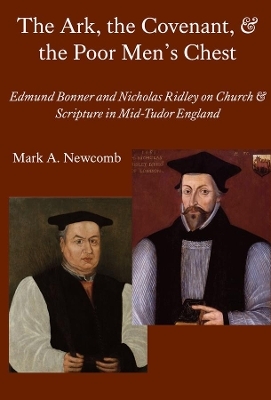
The Ark, the Covenant, and the Poor Men`s Chest – Edmund Bonner and Nicholas Ridley on Church and Scripture in Mid–Tudor England
Seiten
2020
St Augustine's Press (Verlag)
978-1-58731-035-5 (ISBN)
St Augustine's Press (Verlag)
978-1-58731-035-5 (ISBN)
What role did Humanism play in the emergence of English Protestantism? This question has remained a live issue for Reformation scholarship over the past four centuries. In The Ark, the Covenant, and the Poor Men’s Chest, the author examines the issue in detail, utilizing categories drawn from the research of John W. O’Malley on the application of different modes of classical rhetoric to biblical interpretation during the Renaissance.
Anyone interested in either the revival of classical learning during the Renaissance or the religious upheaval of the English Reformation will benefit from reading this work. The book’s focus on primary sources from the sixteenth century and the best insights from recent secondary scholarship yields insights that will be of great interest to specialists in the field of Renaissance and Reformation studies. The inclusion of a timeline of major events, a biographical index of major figures, and a glossary of theological terms make this work accessible and helpful for students with varying degrees of familiarity with early modern England.
Comparing the exegetical writings of Erasmus and John Colet, the author illustrates the key differences between Erasmian and Italian Humanism. Erasmus’ reliance upon deliberative oratory for the explication of scripture, and his preoccupation with a Platonic philosophia Christi, result in an oracular Christology, focused narrowly on the speech of Jesus. By contrast, Italian Humanism relies upon epideictic rhetoric, and yields a portrait of Christ that highlights the deeds of the Messiah and the paschal dimensions of His salvific work, as seen in the writings of John Colet. These divergent patterns of biblical interpretation are also characteristic of the writings of the two bishops of London during the Reformation, Edmund Bonner (imprisoned under Edward VI, and returned to his diocese by Mary Tudor), and Nicholas Ridley (assistant and confidant to Thomas Cranmer). Their contrasting approaches to scriptural interpretation suggest that opting for either Italian or Erasmian Humanism may have been decisive, both for Ridley’s Protestantism and Bonner’s Catholicism.
Anyone interested in either the revival of classical learning during the Renaissance or the religious upheaval of the English Reformation will benefit from reading this work. The book’s focus on primary sources from the sixteenth century and the best insights from recent secondary scholarship yields insights that will be of great interest to specialists in the field of Renaissance and Reformation studies. The inclusion of a timeline of major events, a biographical index of major figures, and a glossary of theological terms make this work accessible and helpful for students with varying degrees of familiarity with early modern England.
Comparing the exegetical writings of Erasmus and John Colet, the author illustrates the key differences between Erasmian and Italian Humanism. Erasmus’ reliance upon deliberative oratory for the explication of scripture, and his preoccupation with a Platonic philosophia Christi, result in an oracular Christology, focused narrowly on the speech of Jesus. By contrast, Italian Humanism relies upon epideictic rhetoric, and yields a portrait of Christ that highlights the deeds of the Messiah and the paschal dimensions of His salvific work, as seen in the writings of John Colet. These divergent patterns of biblical interpretation are also characteristic of the writings of the two bishops of London during the Reformation, Edmund Bonner (imprisoned under Edward VI, and returned to his diocese by Mary Tudor), and Nicholas Ridley (assistant and confidant to Thomas Cranmer). Their contrasting approaches to scriptural interpretation suggest that opting for either Italian or Erasmian Humanism may have been decisive, both for Ridley’s Protestantism and Bonner’s Catholicism.
Mark A. Newcomb, Headmaster of Saint Theresa Catholic School in Sugar Land, Texas, graduated from Duke University Divinity School and Fordham University, where he earned a Ph.D. in Historical Theology. Formerly Executive Vice President at Mount Saint Mary College in New York and Associate Dean for Academic Affairs at Belmont Abbey College, Dr. Newcomb is not only a Renaissance and Reformation scholar but also a leader in classical education in the Catholic Intellectual Tradition.
| Erscheint lt. Verlag | 20.8.2020 |
|---|---|
| Verlagsort | Indiana |
| Sprache | englisch |
| Maße | 152 x 232 mm |
| Gewicht | 516 g |
| Themenwelt | Geschichte ► Teilgebiete der Geschichte ► Religionsgeschichte |
| Geisteswissenschaften ► Philosophie ► Philosophie des Mittelalters | |
| Geisteswissenschaften ► Religion / Theologie ► Christentum | |
| ISBN-10 | 1-58731-035-X / 158731035X |
| ISBN-13 | 978-1-58731-035-5 / 9781587310355 |
| Zustand | Neuware |
| Haben Sie eine Frage zum Produkt? |
Mehr entdecken
aus dem Bereich
aus dem Bereich
Herkunft, Blüte, Weg nach Osten
Buch | Hardcover (2024)
C.H.Beck (Verlag)
39,00 €
Von den Anfängen bis zur Gegenwart
Buch | Hardcover (2022)
C.H.Beck (Verlag)
34,00 €
warum die Religionen erst im Mittelalter entstanden sind
Buch | Hardcover (2024)
C.H.Beck (Verlag)
38,00 €


